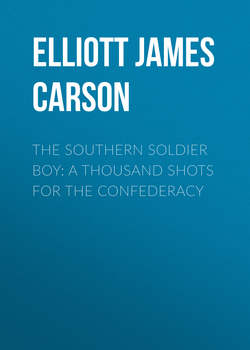Читать книгу The Southern Soldier Boy: A Thousand Shots for the Confederacy - Elliott James Carson - Страница 3
The Jamestown Exposition
ОглавлениеThe 26th of April, 1607, is the date that will linger in history after many a dreary record of battle and coronation has been swept away. For on that date the first permanent colony of English speech made its landing on the soil of North America. It is fitting that the three hundredth anniversary of this event should be marked by the opening of the Jamestown Exposition.
The founding of Jamestown was not a step in a struggle, but a trophy of victory. And, though it began the westward march of the Saxon tongue, which has long since encircled the globe, it marked the victory less of a race than of a civilization. It was really the dedication of a continent to individual liberty; it was the definite announcement that the worn-out systems of empire should not usurp the new western land. It was a trophy gained in a hundred years of such warfare as the world has rarely seen, but it was a thousand times worth the price.
When the peoples of Europe landed on the shores of the sixteenth century, they were a curiously assorted company. Germany was still playing the solemn farce of the Roman Empire, whose real existence had terminated a thousand years before. Spain had just driven the last armed infidel from her borders, and was preparing to use in foreign conquest the military excellence she had developed in her long crusade at home. Italy, divided into a dozen small states, had carried civilization as high as a purely city civilization can go, and was ready to decline. France was halting between two opinions, but, on the whole, leaned strongly toward the course of European aggression, which she pursued for centuries. All these countries were organized on the military plan. The individual counted for little among them; commerce counted for less; all who were not soldiers could escape contempt only by becoming priests. In England and Holland a different organization prevailed. There the civilization was industrial, rather than military. Commerce was accounted a worthy work; not so high as fighting, of course, but still perfectly respectable; and the individual enjoyed a freedom and security unknown elsewhere.
Which type of civilization would endure? That was the great question before the world. Would the soldier and aristocrat, or the merchant and artisan, survive in the struggle which had already begun? The sixteenth century passed, and the contest was decided. The sturdy mechanic had outworn his armored and tinseled lord. Italy was ruined; Germany broken in two; Spain hopelessly wrecked; France, bled white by civil war, was gasping for breath. But England and Holland stood erect and at ease; and, pausing only to make sure that the victory was theirs indeed, went forth to possess the world. Jamestown and New Amsterdam were the first efforts of the free northern peoples to possess the land they had won.
And not only was Jamestown the first English colony on the continent, but it was the first white settlement that deserved the name of colony at all. The adventures of the Spaniards were not colonizing, but conquest. They were crusaders, going forth to found kingdoms, not settlers seeking out homes. They went to the most densely inhabited parts of the new world, simply because only a dense population of slaves could uphold the costly military type of Spanish civilization. The English came as homemakers. They sought out the unsettled parts of the land, and these they covered with a working civilization. Bad as slavery afterward became in this country, it never had a twentieth part of the influence on our life that the same institution had in Spanish lands. The result is history. The industrial civilization which had beaten militarism on its own ground in the old world, outstripped it with ridiculous ease in the new. Spain had a century’s start, yet to-day two-thirds of the white people on the Western continent speak the English language and live within the borders of the United States.
